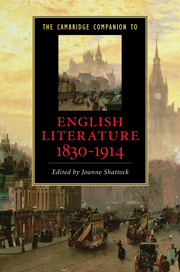15 - European exchanges
from Part III - The centre and the periphery
Published online by Cambridge University Press: 28 November 2010
Summary
Written around 1851, Matthew Arnold’s 'Dover Beach' describes the 'tremulous cadence slow' (line 13) of pebbles on the shore. The melancholy lyrical impression produced by this 'eternal note of sadness' (line 14) underlines the over-determined border with the European continent, figuring contemporary anxieties about political insecurity. There was reason to fear for what Tennyson terms in 1852 England’s 'sacred coasts': in December 1851, Louis Napoleon Bonaparte’s coup d'état raised invasion fears in Britain. A civilian rifle club movement was established to protect the vulnerable south coast, which Tennyson himself joined. Meanwhile, Pre-Raphaelite artist William Holman Hunt was working on a painting on the south coast of England originally entitled Strayed Sheep, Our English Coasts (1852), depicting sheep perilously close to the cliff edge, suggesting an acute sense of national defencelessness. For Arnold, the monumental 'Glimmering and vast' (line 5) cliffs of Dover morph into 'a darkling plain
Swept with confused alarms of struggle and flight
Where ignorant armies clash by night' (lines 35-7). Arnold’s poem (like Thomas Hardy’s pre-World War 1 poem 'Channel Firing') offers an acute epistemological anxiety about invasion and the disintegration of identity. It is, indeed, impossible to imagine Britishness without reference to a fraught relationship with Europe. Although British collective national identity was often seen in the nineteenth century to be challenged by the continent, the collective invention of Britishness was contingent upon the nation’s relationship with other countries.
- Type
- Chapter
- Information
- The Cambridge Companion to English Literature, 1830–1914 , pp. 285 - 303Publisher: Cambridge University PressPrint publication year: 2010
- 2
- Cited by



